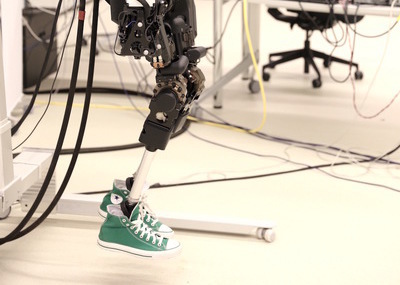"Revolutionizing" the way robots move in complex environment
The Movement Generation and Control Group is an important partner of the new European Project Memmo
- 20 November 2018
- Movement Generation and Control
The EU funded Memmo project aims to revolutionize the way robots with arms and legs move by developing novel real-time methods for motion generation of complex robot, able to cope with the complexity of humanoid and other legged robots in realistic industrial and medical environments. The 4-year-project, led by the LAAS-CNRS in France, involves 10 different partners across Europe including the Movement Generation and Control Group at MPI-IS.
What if we could generate complex movements for arbitrary robots with arms and legs interacting in a dynamic environment in real-time? Such a technology would certainly revolutionize the motion capabilities of robots and unlock a wide range of very concrete industrial and service applications: robots would be able to react in real-time to any change of the environment or unexpected disturbance during locomotion or manipulation tasks. However, the computation of complex movements for robots with arms and legs in multi-contact scenarios in unstructured environments is not realistically amenable to real-time with current computational capabilities and numerical algorithms.
The project Memmo aims to solve this problem by 1) relying on massive off-line caching of pre-computed optimal motions that are 2) recovered and adapted online to new situations with real-time tractable model predictive control and where 3) all available sensor modalities are exploited for feedback control going beyond the mere state of the robot for more robust behaviors. Memmo will develop a unified yet tractable approach to motion generation for complex robots with arms and legs.
The project will develop 3 industrial demonstrators for the future of aircraft manufacturing, rehabilitation of paraplegic patients and inspection of large engineering structures.
Memmo is a collaborative project supported by European Union within the H2020 Program, under Grant Agreement No. 780684. The project starts in January 2018, for 4 years, and involve LAAS-CNRS (France), IDIAP (Swiss), Univ. Edinburgh (UK), Max-Planck Institute (Germany), Univ. Oxford (UK), PAL-Robotics (Spain), Wandercraft (France), Airbus (France), Costain (UK) and APAJH (France).
More information about the project can be found on its official webpage: http://www.memmo-project.eu/




